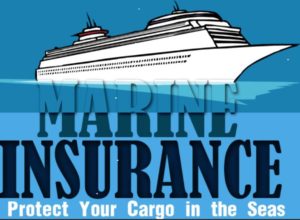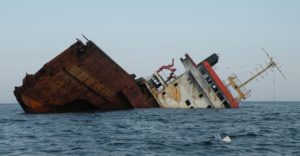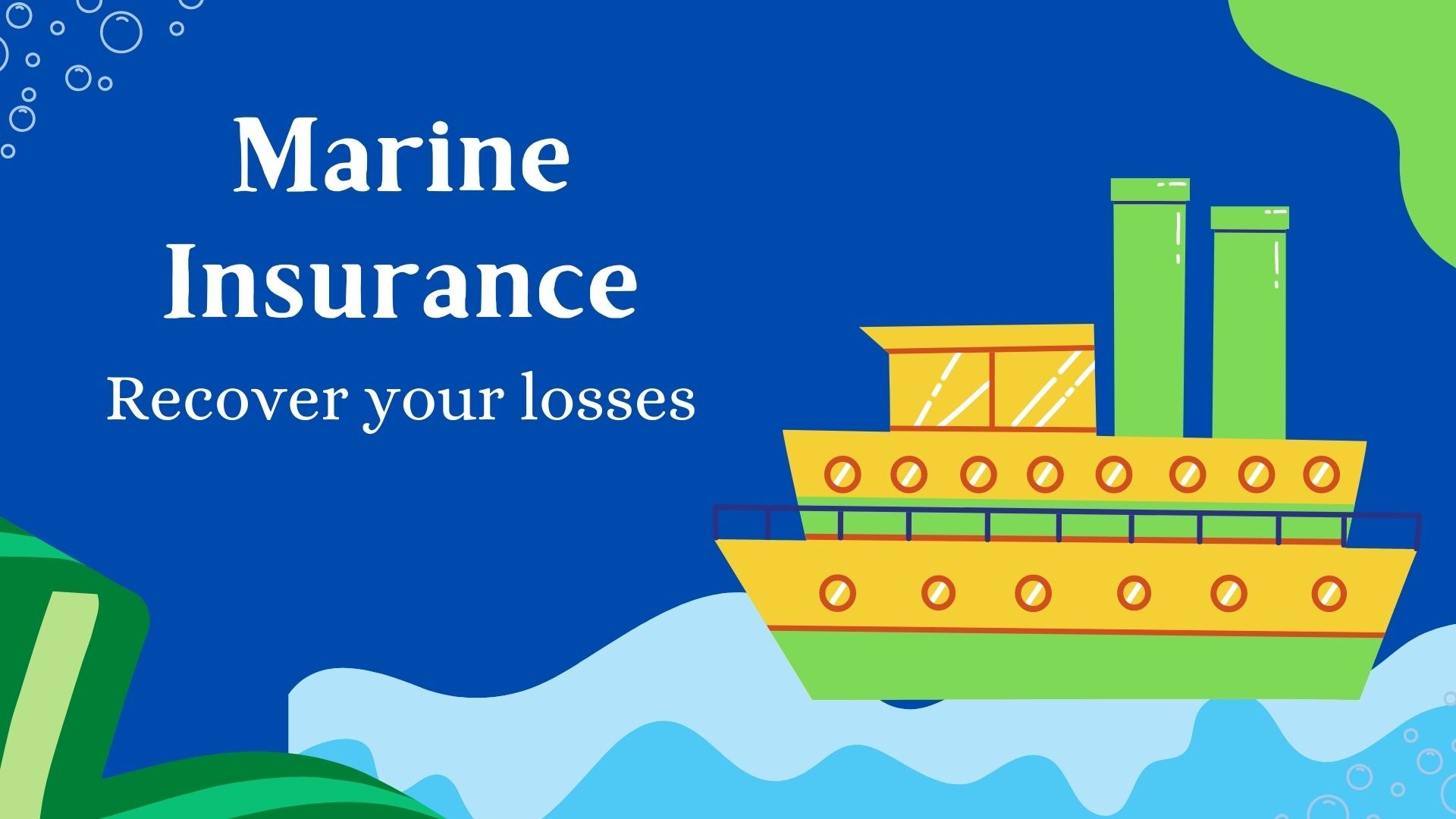When an unsinkable ship like the Titanic drowned in the North Atlantic, in just 3 hours, then no man-made ships stand a 100% survival chance. Back then even Titanic which was labeled as “a ship that even God couldn’t sink” was insured by Lloyd’s of London, for a premium of 7500 pounds sterling. All the claims were settled within 30 days and the loss was absorbed by the Insurance company. Now you know why marine insurance is so important and why one should have it.
Table of Contents
What is Marine Insurance?
Marine insurance came into existence because of the need to transport goods from one location to another through ships. It is a type of insurance that covers goods during transport by water. Some of the risks that marine insurance covers are the sinking, collision, and capsizing of vessels, as well as the theft or damage to cargo. It is basically a contract to take care of any loss to the goods or to the ship in transit and also helps recover the loss in case of any incident due to unforeseen circumstances if the ship sinks. Ships out on sea or ocean are exposed to the risk of sea storms, obstacles like icebergs, weather conditions, etc, so there is an inherent risk. Marine insurance is a solution to absorb that risk. This insurance is often used in conjunction with other types of insurance, such as property and casualty. It can also be used in conjunction with marine cargo coverage, which provides additional protection for goods transported by sea.
It is a contract between the insurer and insured whereby the insurer undertakes to indemnify the insured in a manner and to the interest thereby agreed, against marine losses incident to marine adventure as per Marine Insurance Act, 1963.
What are the different types of Marine Insurance?
There are different types of marine insurance to cater to specific risks existing in ship voyages. Broadly the marine insurance is divided into hull and cargo insurance while the other 2 are extensions of both. Below is the type of marine insurance available to you:
- Hull insurance
If you are looking to cover risks for your ship including the body of the ship and all the things that help in its functioning. Basically, it is the insurance of the vessel and its equipment. This type of insurance is preferred by the owners of the ship who want to be indemnified in case of any damage to their ship.
- Cargo Insurance
This is a popular one and you should get it in case you are shipping your products through sea. It involves insurance of wares, merchandise, property, goods, etc. It helps the owner of the good to rest assured that in case of any damage to its good, he will be indemnified.
- Freight insurance
What if the ship gets lost or meets with an accident? The freight charges you gave will be gone along with your good. There comes freight insurance to protect you against such risk.
- Liability insurance
It is more like third-party insurance in cars. Where if any damage occurs to any other ship, or goods or to anyone by the insured ships then liability insurance will come into play. It helps cover risks occurring to others by insured ship.
What are the different types of Marine insurance policies?
Just like there are different types of marine insurance to cover the risks occurring due to specific circumstances. Similarly, below are different types of insurance policies based on various needs and preferences of the insured:
- Voyage policy
As the word states, it is valid only for a particular voyage. The insurance is valid from the time the voyage starts till the time it ends.
- Time policy
This policy brings the time element, thus marine insurance for a specified time duration is called a time policy. During that time period, all the voyages will be covered. The time policy is valid for usually 1 year.
- Valued policy
In this type of policy, the value of the cargo and consignment is ascertained and is mentioned in the policy document beforehand. Thus, making clear the value of the reimbursements in case of any loss to the cargo and consignment. This policy is specific about the value of the goods or consignment and aims to protect the value of the same.
- Port risk policy
This kind of marine insurance policy is taken out in order to ensure the safety of the ship while it is stationed in a port.
- Wager Policy
A wager policy is one where there are no fixed terms of reimbursements mentioned. If the insurance company finds the damages worth the claim, then the reimbursements are provided, else there is no compensation offered. It has to be noted that a wager policy is not a written insurance policy and as such is not valid in a court of law.
- Mixed policy
A marine insurance policy that offers a client the benefit of both time and voyage policy is recognized as a mixed policy. It is mix of both time and voyage policy.
- Open or Unvalued Policy
In this type of marine insurance policy, the value of the cargo and consignment is not put down in the policy beforehand. Therefore, reimbursement is done only after the loss to the cargo and consignment is inspected and valued.
- Floating policy
A marine insurance policy where only the amount of claim is specified and all other details are omitted till the time the ship embarks on its journey, is known as a floating policy. For clients who undertake frequent trips of cargo transportation through waters, this is the most ideal and feasible marine insurance policy.

Types of Clauses
With different types of marine insurance policies come various clauses so as to specify what will make the policy void under which circumstances.
- Assignment clause
This clause makes it clear that the marine policy is freely assignable unless this is expressly prohibited. Cargo policy is freely assignable and no notice is required to be given to the insurer/underwriter. But in the case of Hull insurance consent of the underwriter is essential.
- Lost or not lost clause
The meaning of this clause is that the insurer ensures the subject matter irrespective of the fact that it has already been lost or not lost before the issue of the policy. Both parties have no information whether the subject matter is lost or not lost. In recent times this clause has lost much of its importance since communication has become transparent.
- At and from clause
It determines the time when the actual risk commences. As soon as the ship will arrive at the port the risk will commence. It means the policy covers the subject matters while it is lying at the port of departure and from the time the ship sails when the policy contains from only instead of At and Form.
Cargo – From the time the cargo is loaded on the vessel
Voyage – From the particular place where the ship arrives safely
- Warehouse to warehouse clause
In order to cover the inland risks from the original place of departure to the port of sailing and from port of discharge to the place of final destination are insured under this clause. Thus, the risk of land and transport are also covered under a single marine policy.
- Deviation clause
The ship should not deviate from the course of the voyage described in the policy. A mere intention of deviation is not material, there should be an actual deviation to avoid the policy.
- Touch and stay clause
The ship in course of the voyage must touch and stay at such ports and in such order, as are mentioned in the policy, the ports must be in the ordinary course of the voyage.
- Running down clause
This clause is also called the collision clause and is included in hull policies. It provides that the underwriter agrees to take upon the liability of the owner of the ship for damage done by his vessel to another vessel on collision to the extent of three-fourths of such liability. The full protection can be given by deleting the words Three-fourths from the clause.
- Sue and labor clause
This clause requires underwriters to pay any expenses properly incurred by the insured or his agents in preventing or minimizing loss or damage to the subject matter. The reasonable expenditure is payable even though it may be, in addition, to a total loss.
- Reinsurance clause
The reinsurer is liable only for claims for which the original underwriter is liable.

Insurance premium
Marine insurance premium depends upon the 2 major insurance types which are hull and cargo insurance.
Hull insurance
The insurance premium will depend upon the below factors:
- Management – Upkeep of vessel – good or bad
- Natural Forces – Character of the route.
- Permanent Hazards or Seasonal Hazards – references are made to storms, narrow channels, ice, currents, port condition – depth sufficient or not, etc.
- Construction, type, and nationality of the vessel
Cargo Insurance
The insurance premium will depend upon the below factors:
- Ownership: At the same ship, two separate ownerships for the same kind of cargo and the same destination may have different rates.
- Character: Packing, durability, forms of the commodities.
- Hazards & Customs – seasonal hazards and custom rates
- Quality and Suitability of Vessel used
- Duration of the voyage – time and loading
Marine Insurance Losses
The type of losses covered in case of mishappenings are discussed below
- Total loss
When the subject matter is fully destroyed or lost or ceases to be a thing of its kind. In case of a total loss, the insured stands to lose to the extent of the value of the property provided the policy amount was to that limit.
Total loss can be further classified into an actual and constructive total loss
Actual total loss
Below circumstances lead to actual total loss
- The subject matter is destroyed. Example-ship is entirely destroyed by fire
- The subject matter is so damaged as to cease to be a thing of the kind insured. For example- food (consignment) badly damaged by seawater is now unfit for human consumption.
- Where the subject matter is lost. Example -a ship missing for a very long time and no news about it.
Constructive total loss
There is a thin line between the actual and constructive total loss as explained below:
- The subject matter insured is reasonably abandoned on account of its actual total loss appearing to be unavoidable
- The subject matter could not be preserved from actual total loss without an expenditure that would exceed its repaired and recovered value
For example – the cost of repair and replacement was estimated to be Rs.50,000 whereas the ship was estimated to be Rs. 40,000. The ship may be abandoned and will be taken as a constructive total loss. But if the value of the ship was more than Rs. 50,000 would not be a constructive total loss.
The difference between an actual total loss and constructive total loss is that actual total loss is related to the physical impossibility whereas constructive total loss is related to commercial impossibility.
- Partial loss
When only the part of the subject matter is destroyed or lost then it is called partial loss.
GEICO Boatus insurance policies
GEICO Boat Insurance: GEICO offers boat insurance coverage that typically includes:
- Physical Damage Coverage: This covers damage to your boat, motor, and trailer. It can protect against damage caused by accidents, storms, theft, and vandalism.
- Liability Coverage: This helps cover the costs if you’re at fault in a boating accident and someone else’s property is damaged, or if someone is injured.
- Medical Payments Coverage: This can help pay for medical expenses for you, your passengers, and others on your boat in case of an accident.
- Uninsured/Underinsured Boaters Coverage: This covers you and your passengers if you’re involved in an accident with an uninsured or underinsured boater.
- Towing and Assistance: Some policies may include coverage for on-water towing and other assistance services.
- Wreck Removal: In case your boat sinks or becomes a navigational hazard, this coverage helps with the costs of removing it.
BoatUS Insurance: BoatUS doesn’t underwrite boat insurance themselves but partners with multiple insurance providers, including GEICO, to offer boat insurance policies. Coverage options can vary depending on the provider, but you can typically expect:
- Comprehensive Coverage: Similar to GEICO, BoatUS partner insurance companies offer comprehensive coverage for physical damage to your boat, motor, and trailer.
- Liability Coverage: Liability coverage for property damage and bodily injury is a standard feature.
- Medical Payments: This coverage can help pay for medical expenses for injuries sustained on your boat.
- Towing and Assistance: Many policies provide on-water towing and assistance services.
- Agreed Value or Actual Cash Value: You may be able to choose between an agreed value policy (where the insurer and you agree on the value of your boat upfront) or an actual cash value policy (where the boat’s value is determined at the time of the loss).
- Personal Effects Coverage: Some policies may offer coverage for personal belongings on your boat.
- Hurricane Haul-Out Coverage: In hurricane-prone areas, policies may include coverage for hauling your boat out of the water to protect it from storms.
Keep in mind that the specific terms and conditions of your boat insurance policy will depend on the insurance company, the type and value of your boat, your location, and other factors. It’s essential to contact the insurance provider directly or work with a licensed insurance agent to tailor a policy that suits your individual needs and preferences.
FunFact:
Marine insurers drop automatic war coverage, further complicating the shipping sector. This came as a surprise when Russia’s Ukraine war broke out.
Did you take marine insurance for your product?

